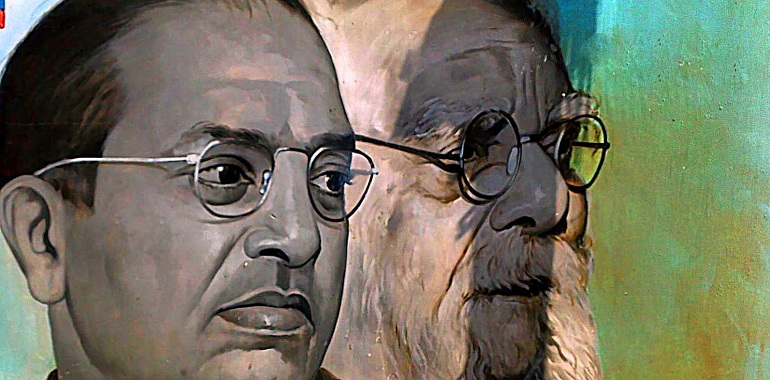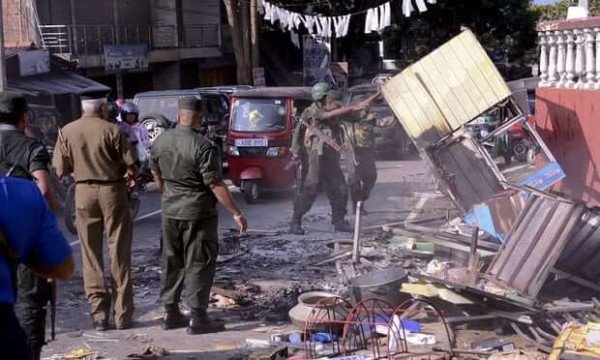
The social, political, and economic arrangements of a society can place some people in a privileged position relative to others, particularly with respect to important goods, like institutional representation, economic resources, and even less tangible goods like “respect” and “welfare”. Since societal arrangements are not always brought into reflective awareness, it is unsurprising when even well meaning and well-intentioned members of privileged groups are unaware of how they may benefit from social arrangements relative to members of other groups.
Many times have we experienced “upper-caste” Tamils unable and unwilling to recognize the privilege they hold vis-à-vis “lower-caste” Tamils in Sri Lanka and beyond. Sometimes they may well be aware of some of the difficulties faced by oppressed caste members. Sometimes they may even work for the betterment of other communities in the island, but this hardly ever translates into wider acknowledgment of the privilege centred around their “upper-caste” Tamil identity.
The denial of these privileges is widespread. Often we find “upper-caste” people relativising the inequalities felt by deprived caste Tamils, deflecting the undercurrent of casteism that produces systemic and sociocultural inequalities which continue to haunt the island and its diasporas.
This list attempts to highlight some of the privileges provided to “upper-caste” Tamils in Sri Lanka and beyond just because they are, yes, Tamils of “upper-caste” origin. Noting these privileges are not meant to antagonize or alienate people of privileged caste origin but rather raise awareness and self-consciousness about how caste identities indeed do play a role in the way they perceive, interact, and ultimately, politicize minorities on the island as well as its diasporas.
It is also meant to show the extensive ways that caste identities can track inequalities in opportunity and welfare within a society and displacement. With this compilation we hope to ignite meaningful conversations and introspections into what it means to be a Tamil of “upper-caste” origin and ultimately what it means to not be of “upper-caste” origin in Sri Lanka and beyond.
Caste Privilege
1) You don’t have to ever acknowledge your caste identity and its attendant privileges.
2) You can think that the invisibility of your caste identity speaks to the erasure of caste as a relevant social system of organisation and segregation.
3) You can think that not being aware of your caste stems from progressive education.
4) You think that not speaking about caste is an act against the caste system, and you do so without having to consider that silencing caste makes it more difficult to challenge the caste system and easier to recode, invisibilise and mainstream it.
5) You can talk about anti-casteism without ever having to name the social group that holds power and sway over every other caste group in the diasporas and homeland (here: Vellalar caste group).
6) You can think that to say that you are against caste already translates into social change.
7) You can claim that the caste system has become obliterate with time while simultaneously continuing to enjoy the fruits of century-old socially constructed inequalities and exclusion.
8) You are able to increasingly replace caste with class in your socio-economic analysis without acknowledging that the historic caste/class overlap, particularly in the homeland, continues through long-term structural effects to affect questions of access and opportunity even years, decades, and centuries later.
9) You can emphasise class over caste as a means to deflect from the importance of caste as a contemporary social marker.
10) You can deny the historic, contemporary, physical and social violence of casteism amongst island Tamils by pointing to the severity of the caste system in neighbouring India.
11) You can oversimplify by saying that “untouchability”, as understood in the Indian context, never existed in Sri Lanka, therefore caste injustices “can’t have been as bad as in India”(although “untouchability” still existed on the island).
12) You can reduce oppression, inequalities and injustices felt by the Tamil people to those committed by the Sri Lankan state.
13) You can be progressive enough to talk about intersectionality with regards to race, ethnicity, gender, class and sexuality while erasing the question of caste from your analysis.
14) You can become an authority on caste without ever having to acknowledge your own privileged caste background and its resulting limits and subjectivities.
15) You can question the “objectivity” of oppressed caste members’ activism, research and work on caste issues based on their own membership in stigmatized caste groups.
Education and Employment
16) You can think of your parent’s aspiration for your (future) job to be completely isolated from the century old caste traditions and aspirations they grew up with.
17) You often have better support mechanisms to access and complete higher education based on the historic proximity of privileged caste members to educational institutions.
18) You can face little or less pressure to perform well or outperform others in education and employement based on your caste identity and history.
19) You can deny that caste discrimination in the employment sector continues to exist amongst Tamils, particularly amongst diasporic communities.
20) You can normalize the casteist organisation of society according to occupational practices.
Migration & Diaspora
20) You can denounce the importance of anti-caste activism in diaspora because apparently “caste doesn’t exist anymore”
21) You can overlook that migration meant for many (upper) caste-Tamils the loss of secular status by losing their inherital socioeconomic privileges on arrival in diaspora and ritual purity by having crossed the Indian Ocean.
22) You can overlook that migration meant for many deprived caste Tamils the relative liberation from caste stratified societies and socioeconomic as well as sociocultural diktats.
23) You can claim that patterns of migration from Sri Lanka had no caste linkage.
24) You can claim that the remittance economy that links diasporas and the homeland today does not reflect caste patterns and allegiances.
25) You can deny that the remittance economy further amplifies social divisions and inequalities between different caste groups in the homeland.
25) You can claim that all refugees experienced flight and integration the same without acknowledging how questions of caste and class altered or limited some people’s choices, opportunities, and adaptabilities.
26) You can deny that caste assumptions and prejudices are recreated and projected in the Tamil vernacular onto new diasporic geographies.
27) You can think of the question of “what’s your ‘ur’(home)?” as an uncritical and sentimental reflection of curiosity/nostalgia without having to consider the socioeconomically profiling/castefying as well as social violence that is hidden behind questions of geographic belonging in Sri Lanka.
Individual Histories & Memories
28) You don’t have to hide your personal biographies or rewrite your own personal history in order to circumvent the possibility of experiencing discrimination.
29) You don’t have to constantly fear for your web of lies and social buffers to be discovered and revealed.
30) You can challenge the reinvention and rewriting of identities and social histories of deprived caste members in diaspora as you consider your history as socially incontestable and free of social stigma.
31) You can proudly attest to your history without having to care about the social consequences.
32) You can publicly remember and mourn your social position back home without ever having to acknowledge how your privileged caste background entitled and made you inherit your place in society.
33) You can remember your socioeconomic background without having to acknowledge how you benefited from caste inequalities, and how you were inherently embedded and complicit in the exploitation of “lower caste groups”.
Society & Culture
34) You don’t have to fear discrimination amongst larger groups of Tamils based on your caste background.
35) You don’t have to acknowledge that caste is as deeply embedded in Tamil language as it is embodied within and by Tamil culture as a whole.
36) You can deny that negative caste assumptions and associations are made in regards to skin complexion.
37) You can deny that aesthetics, particularly regarding women, in the Tamil community are based on a history of casteification of body and mind.
38) You can disregard the ways caste shapes aesthetic ideals by pointing to European colonialism.
39) You have normalized the social violence that lies underneath everyday relations between different caste groups, including in the diasporas.
40) You can hide casteist mentalities by coding caste-based languages to hide caste attributions and judgements made in regards to social behaviourism.
40) You are quick to challenge any caste group that assumes to hold equal power to your own caste group (here: Vellalar caste group).
41) You can deny that your social surrounding is, with most likelihood, already caste gentrified.
Religion
42) Your religious identity isn’t challenged by Hinduism’s socially discriminatory practices.
43) You don’t have to question the extent of Brahmanism within Tamil Hindu culture and beliefs.
44) You can deflect from personal responsibilities in regards to caste-based inequalities by pointing to Brahmins as the gatekeeper of caste structures and hierarchies.
45) You can be quick to point to the lower secular status of Brahmins in regards to socioeconomic parameters in Sri Lanka (unlike India), without having to acknowledge that your secular superiority equals to greater responsibilities in regards to caste inequalities and violence.
46) You’re able to be religious without feeling the need to interrogate or critique Hinduism’s role in creating caste as a way organizing societies.
47) You can assume that anyone who converted to Christianity or another religion must be of deprived caste status.
48) You can say that discrimination in religious institutions have ceased to exist with the 1968 Temple Entry Movement.
49) You can locate discriminations in religious institution to Sri Lanka while being ignorant about the existence and importance of casteism in temples abroad.
Marriage
50) You can say that caste doesn’t matter in diaspora while the majority of intra-communal marriages continue to be along caste-based lines.
51) You can say you don’t believe or care for caste but have no remorse over your family arranging marriage proposals according to caste-based lines.
52) You can claim that matrimonial sites and outlets’ insistence on caste doesn’t reflect the reality of marriages to be engineered according to caste ideology.
53) You can think the absence of the usage of the word “jaati/saathi” indicates to the erosion of the importance of caste as an ideology.
Intercaste Marriages
54) You can arbitrarily judge or force someone from an inter-caste marriage to decide between caste identities
55) You can assume someone’s caste identity based on prejudicial viewpoints
56) You don’t have to deal with the consequences of being unaccepted amongst both privileged and oppressed castes.
57) You can challenge someone from an inter-caste marriage on their “authenticity” if they choose to identify with one identity over the other.
58) You can live a life without negotiating identities and histories based on caste fault lines.
Writing of History
59) You don’t have to question the writing of history of the people because your presence won’t be unsettled or threatened by the current and dominant upper-caste narrative.
60) You are more comfortable in remembering anti-Tamil violence that affected the centres of upper-caste, (upper) middle class, urban life than those of deprived caste, low class and rural background.
61) You can be sure to encounter narratives and other forms of expression that reflect a similar experience as yours/your family’s than one of caste-difference.
62) You can think the mainstream postcolonial history of Tamils in Sri Lanka vis-à-vis the Sinhalese’s national building project is reflective of the experience of all subgroups within the heterogenous Tamil community.
Politics
63) You can be certain that identity politics and politics of representation only matter in inter-ethnic relations, but not in intra-ethnic relations.
64) You can claim that we all suffered the same without acknowledging that deprived caste groups were disproportionally affected by war, violence, displacement and destitution.
65) You are quick to incorporate the injustices committed against Hill Tamils by the Sri Lankan state (i.e. 1949 Citizenship Act, Repatriation Act) into your narrative on oppression and genocide of Tamils of the island as a whole (yes, we concur IT IS a genocide), but fail to acknowledge the “upper-caste” “Ceylon Tamil’s” complicity in these legislations as well as forms of social ostracization and exclusion of Hill Tamils based on the social parameter of caste.
66) Some of you may acknowledge the preferential role and benefits enjoyed by the Tamil “upper-caste” society during British colonialism, but fail to acknowledge that not all Tamils were equally positioned during colonialism (and thereafter).
67) You can say that Tamil nationalism has successfully eradicated caste without ever attempting to enquire into the lived reality of deprived caste members today.
68) You can claim that the LTTE’s anti-caste politics were built upon a general social consensus instead of a socio-political and socio-economic diktat imposed upon society.
69) You can externalize the Hill Tamils on the national question (on the basis of caste) while failing to acknowledge their contribution to anti-Sri Lankan state resistance.
70) You can conveniently divorce the history of Tamil resistance from its origin in anti-caste resistance.
71) You can deny that caste politics continue to be part and parcel of electoral politics in the homeland.
72) You can blame deprived caste members for, at times, deviating from the popular Tamil vote without acknowledging the common disregard most Tamil political parties have for deprived castes and their concerns.
73) You can call the TNA the representatives of the Tamil people without ever having to acknowledge that the TNA represents the old boys club of highly educated “upper-caste”, (urban) men who have more often than not inherited their positions of power from an ancestry of privilege.
74) You can be suspicious of the formation of caste allegiances and parties based on caste identity as it challenges the status quo of power relations.
75) You can be sure to find representation of your caste group in almost every meaningful and powerful avenue within the community.
76) You can easily deny that diasporic Tamil political organisations are reflective of an “upper-caste” demographic majority in diaspora.
77) You can deny that the caste background of representatives’of Tamil political organisations has an impact on the political and social position these political institutions take.
78) You think school alumni groups and village groups in diaspora aren’t drawing back on caste identities.
79) You can conveniently deprioritise caste as a social issue that needs less attention than does the national question.
80) You can accuse anyone who raises the question of caste as being a Sri Lankan state or Indian state stooge, thereby making them social and political outcasts.
For more pieces by Sinthujan Varatharajah and Ram Adrian check out their tumblr.
Follow Sinthujan on Twitter via @varathas
























